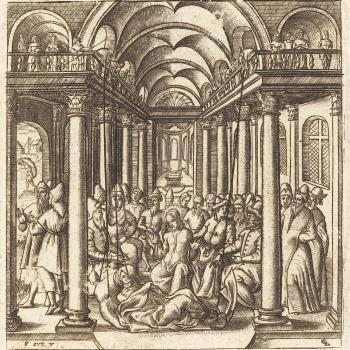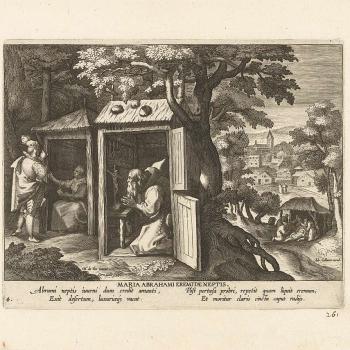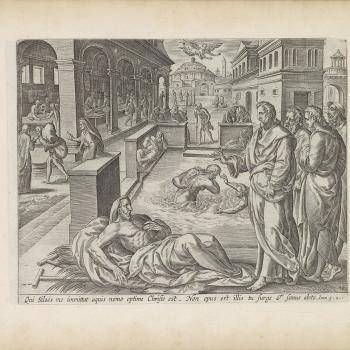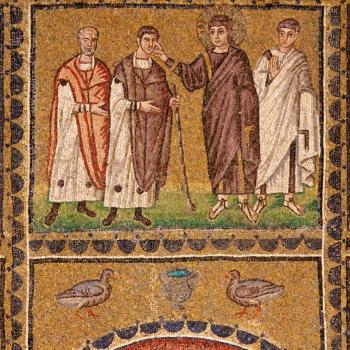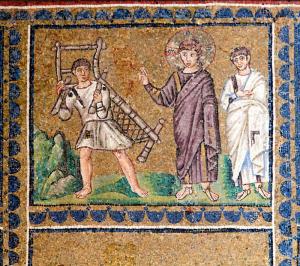
Helping people deal with the wounds which makes them suffer, especially the wounds which paralyze them so much that they cannot get on with their lives, is very important. We must care about each other. We must take care of each other. We must do what we can to make sure no one needlessly suffers. Sadly, so many are paralyzed, not from physical wounds, but from social, psychological, and or spiritual wounds. People often find their lives restricted by society, and so they are incapable of moving on, transcending their present circumstances, incapable, that is, of bettering themselves. Systematic structures of sin are often the cause of such bondage. Sadly, instead of working to overturn such structures of sin, many promote them, consider what they establish as being good, and will do all they can to keep them in place. They say those structures represent the law which must be enforced, and anyone who goes against such laws are the ones who promote evil. Thus, those who claim to support law and order often use legalism as a way promote all kinds of injustices in the name of justice; it is a flaw which is exploited by sin in order to corrupt and destroy society, to make sure as many people are held back and kept in paralysis as is possible.
Not every form of paralysis, therefore, is of the same kind; some people are held down by others, some people are held down by psychological issues and others from physiological difficulties. We should do what we can to help them all. This is what we see Jesus did in his earthly ministry. Christians are called to follow after him and continue to promote the things he did to help heal the world from all the terrible effects of sin. When we read how Jesus engaged others, it is clear, he did what he can to heal them in any way they needed healing. Thus, he would cure them of their health problems, but he would also take care of them spiritually, psychologically, and even socially as well. He lifted them up, overturning whatever obstructions held them back, showing that often it was often a combination of many factors which caused them to be stuck in the position they were in (which is why he told people he healed that their sins had also been forgiven). When we try to do like him, we should also try to heal people and help them out from whatever form of paralysis holds them back. We will find, like him, we will often end up coming in conflict with the people whose power and privilege are threatened due to our work. This is especially true when we deal with systematic structures of sin, because so many feel they have so much to loose if their victims are set free. All kinds of insults, all kinds of false accusations will be given to us for trying to make things better, but we should not let that detour us as it did not detour Jesus:
After this there was a feast of the Jews, and Jesus went up to Jerusalem. Now there is in Jerusalem by the Sheep Gate a pool, in Hebrew called Bethzatha, which has five porticoes. In these lay a multitude of invalids, blind, lame, paralyzed. One man was there, who had been ill for thirty-eight years. When Jesus saw him and knew that he had been lying there a long time, he said to him, “Do you want to be healed?” The sick man answered him, “Sir, I have no man to put me into the pool when the water is troubled, and while I am going another steps down before me.” Jesus said to him, “Rise, take up your pallet, and walk.” And at once the man was healed, and he took up his pallet and walked. Now that day was the sabbath. So the Jews said to the man who was cured, “It is the sabbath, it is not lawful for you to carry your pallet.” But he answered them, “The man who healed me said to me, `Take up your pallet, and walk.'” They asked him, “Who is the man who said to you, `Take up your pallet, and walk’?” Now the man who had been healed did not know who it was, for Jesus had withdrawn, as there was a crowd in the place. Afterward, Jesus found him in the temple, and said to him, “See, you are well! Sin no more, that nothing worse befall you.” The man went away and told the Jews that it was Jesus who had healed him (Jn. 5:1-15 RSV).
The paralyzed man was healed on the sabbath. While, thanks to Jesus, he could get up and walk, and takes his things with him, some tried to tell him that he should not do so, that he should remain where it was, because it was the sabbath. Of course, not everyone would go to that extreme in dealing with the sabbath, indeed, perhaps even those who were telling him to stay where he was, would not be so extreme in their own adherence of the sabbath (though, to be sure, some would not be so hypocritical, and so they would follow their own advice). Now that he was free to move on, so many of those in power and authority were concerned about him and what his new presence in society would mean. They used legalistic excuses to try to hold him back, to keep him paralyzed and stay where he was. Jesus, however, had already told him to get up and walk. The man listened to Jesus. He got up and them made his way to the temple (surely, in order to rejoice and thank God for his healing). Jesus met with him, told him who he was, and said, now that he had been physically healed, he had also been spiritually healed, and just as he could physically get up and walk, he should not feel spiritually burdened by the bondage of sin any longer. The man, therefore, received healing from physical, social, and spiritual forms of paralysis.
We can and will often find ourselves able to share in Jesus’s healing ministry, not by doing all that Jesus did, but by helping relieve people of at least some of the paralysis which comes into their lives; we should help people, that is, grow in spirit as well as in social standing, though of course, if we have the means to physically heal people, we should do so as well. What is important is we make sure we do what we can to free people from the paralysis which stops them from achieving all the good which they can have and all they good they should do with their lives. The more we do so, individually and communally, the more we will see things change for the better, until, at last, we could even say that the changes which have taken place are miraculous, and in that instant, see how God was at work in and through us, even as God was proven to be at work in Jesus with the way Jesus healed those in need, like the paralyzed man.
Stay in touch! Like A Little Bit of Nothing on Facebook.
If you liked what you read, please consider sharing it with your friends and family!








